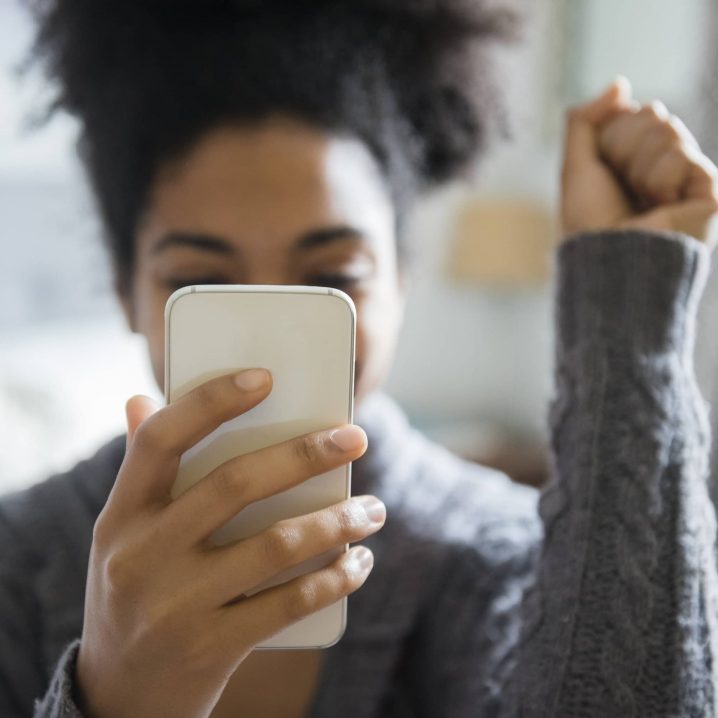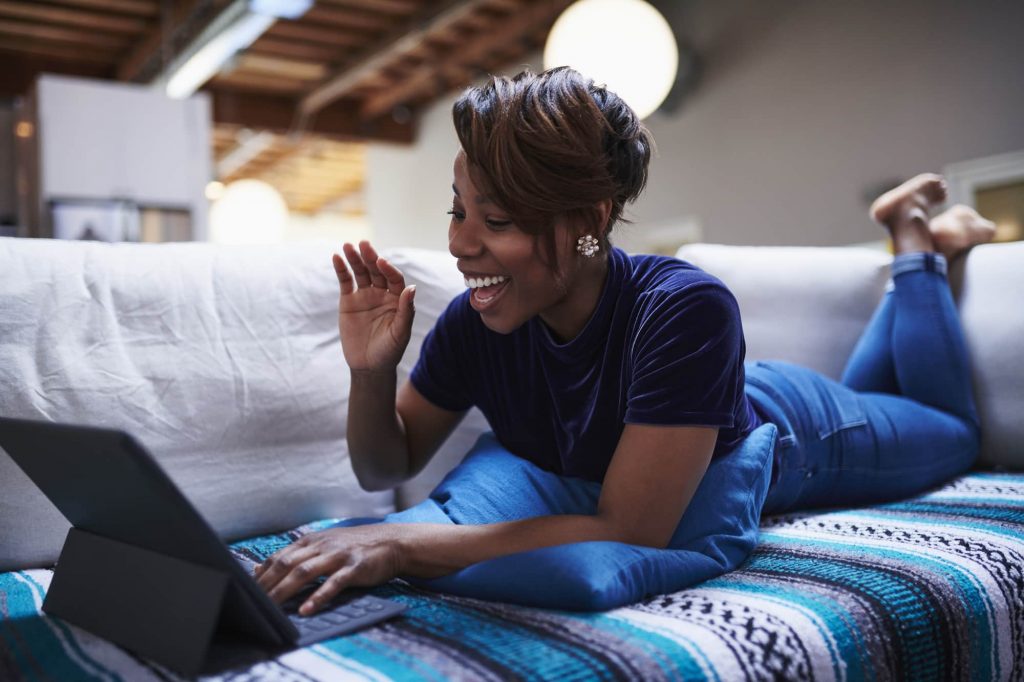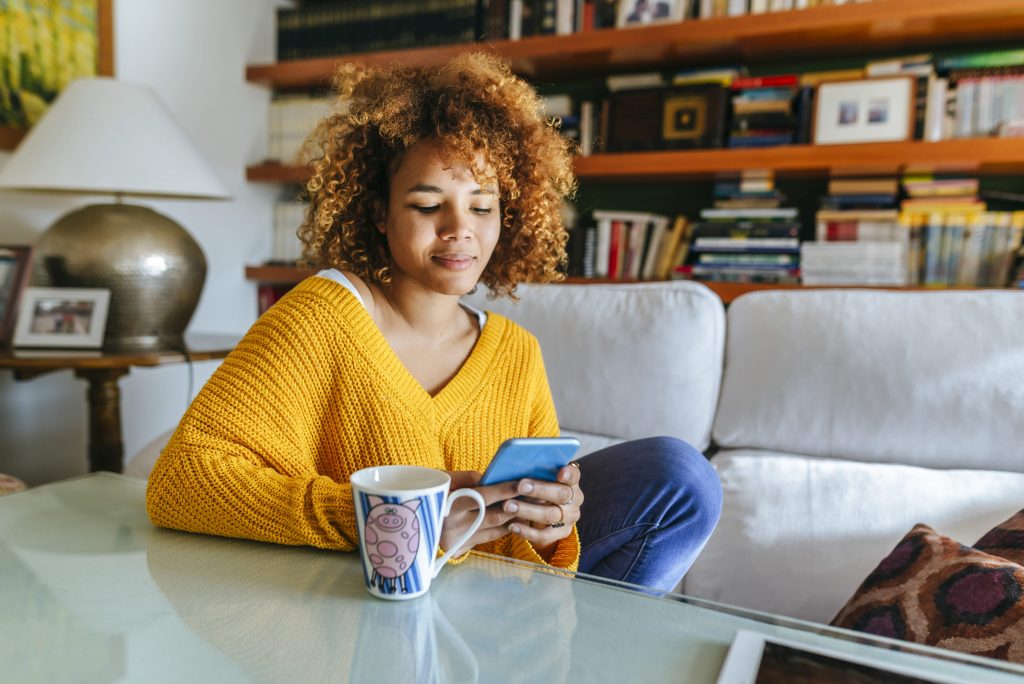
- POPSUGAR Australia
- Fitness
- Here's Why Video Calls Are So Exhausting Now – and 8 Therapist-Approved Ways to Deal
Here's Why Video Calls Are So Exhausting Now – and 8 Therapist-Approved Ways to Deal

At first, all the video calls and virtual meetings were kind of fun. They were opportunities to catch up with friends or family and ways to fill up days that were suddenly empty; there was the novelty of new technology and Harry Potter Zoom backgrounds to jazz up work calls. But weeks turned into months, and for many of us, the endless stream of work meetings, family chats, and Zoom happy hours has started to feel like another source of anxiety and fatigue.
The issue is that many of us are already feeling overwhelmed, said Risa Williams, LMFT, a licensed therapist and online life coach in LA. Job insecurity and fears about health, our own and those of our loved ones, take up an enormous amount of mental energy. If you’re able to work from home, you’re likely working longer hours, not taking lunch breaks, and “losing the time boundaries [you] had before in an office setting,” Williams explained. And we’re spending more time on our screens than ever before, as our weekly iPhone screen reports so helpfully remind us. “We’ve all had to adjust to more Zoom calls, more emails and texts,” Williams said. “Sometimes this leads to digital fatigue, and wanting to withdraw from connecting online socially.”
The fact of the matter is that digital communication, while often effective, “doesn’t offer the same level of unspoken connection with another person,” said psychotherapist Elizabeth Scarlett, cofounder of Behavior Elevation Academy, who works with professional women to prevent online burnout. Our brains are fielding all the same stressful social stimuli as in a conversation, “but without production of our social-hormone oxytocin, it doesn’t feel as good,” said Allison G. Johnsen, LCPC, BCC, manager of behavioral health at Central DuPage Hospital and Delnor Hospital. “We are losing simple touch, handshakes, hugs, plus the nonverbal communication that enriches our human experiences.” We get irritated and burnt out with digital communication because “it ultimately isn’t the human interaction we truly long for,” said psychotherapist Laura F. Dabney, MD.
Unfortunately for many of us, the days of Zoom meetings and family Skype chats don’t seem to be going away anytime soon. The question then becomes how we can manage that burnout and prioritize our own mental health, while continuing to tune in for our jobs and connect with family and friends. It’s all about striking a balance and communicating, therapists say – so we asked them exactly how you can do that, without stepping on toes or isolating yourself. Read on for their tips on setting boundaries and how you can implement them into your stay-at-home life now.
Related: Reentry Anxiety Is Real – Why You May Experience It as Stay-at-Home Measures Ease
Choose the Tech That Feels Best For You
If there’s a certain form of communication that feels better (or worse) for you right now, let your family and coworkers know. “You could say, ‘I really want to hear more about your story and support you. Right now it’s hard for me to read text messages. Let’s schedule a time to talk tomorrow morning so I can give you my full attention. Would 10 a.m. work for you?'” suggested licensed marriage and family therapist Lauren Consul.
If video conferencing is particularly taxing, “ask yourself if video is best or necessary,” said Judy Ho, PhD, clinical and forensic neuropsychologist and host of the SuperCharged Life podcast. “Don’t be afraid to ask for a regular phone call if it will accomplish the same objectives and reserve video conferencing for situations when you must have face-to-face interaction. In general, a brief phone call is less tiresome than a video conference.”
Be Honest About What You Need
“No one needs to cave to pressure to interact with friends and family. It’s all about communicating your needs,” said Rachel Dash-Dougherty, LCSW. In general, be clear that you appreciate them thinking about you and that backing out of a call isn’t about them “but about your own need for self-care,” Scarlett said.
You can do this by using the following formula: “how you are feeling plus a positive personal need,” said Jessica Small, MA, LMFT, a licensed marriage and family therapist with Growing Self Counseling and Coaching. An example could look something like this:
- How you feel: “I’ve been feeling overwhelmed trying to get my work done and homeschool the kids.”
- Positive need: “Would it be OK if I start calling you in the evening after work and the kids are asleep?”
“This formula avoids the other person feeling criticized, blamed, or hurt while the positive need part gives direct feedback on how it can be different,” Small explained.
Set "on" and "Off" Hours
Set blocks of time where you don’t respond to phone calls, texts, and emails, said Nicole Liloia, LCSW, and shorter periods of time when you do. This will help you focus and leave you feeling less overwhelmed by alerts and notifications throughout the day. You could even put your phone in “do not disturb” mode during off hours.
Taking a break from your phone or computer resets your mind and naturally lowers stress levels, Risa Williams said. Make it a mini digital detox with as little tech as possible: meditate, work out, go for a walk, or listen to music, she suggested.
When it comes to family and friends, you could even try setting on and off days, choosing a specific day and time to talk with those reaching out the most, said psychologist Kelly Donohoe. “Often, when loved ones know when they’re going to talk with us, they feel less anxious,” she explained. “It is OK to tell others that we need a break and we are going to turn off our phone for a day, happy to respond tomorrow. This way people know that we are going to take a solitude break and won’t panic.”
Prioritize Solitary Self-Care
“Every day, set aside at least 30 minutes where you get to do something you enjoy on your own,” said Dr. Ho. Take a walk, cook, work on a new hobby or skill, or simply unwind with music and candles. “Put this in the calendar so that people don’t push on this time you’ve set aside for you to recharge,” Dr. Ho said.
If you really need a break from tech, remove screens from your living room and keep the TV off during this time, said licensed mental health counselor Anna Marchenko. “Do not pick up your phone, do not scroll social media. If you are receiving texts and emails from family checking in, respond with honesty, letting them know that you will get back to them in an hour, or however much time you may need to unwind.” Here are more ways you can practice self-care from home.
Create a Schedule
You can structure your day so that you don’t feel overwhelmed with any one thing. Grab a planner and three colored pens, said Melissa Mueller-Douglas, LMSW, licensed social worker and founder of MYRetreat. For each day, write one way to connect with your family, one way to connect with a friend, and one daily self-care practice, using a different color for each. “Try this method out for a week,” Mueller-Douglas said. “Notice the days that you felt joy and the days that you felt drained. Take a look at what helped your mood and what hindered it.”
Set a Time Limit
Whether you’re talking on the phone, tuning into a video call, or texting, give yourself a time limit, said Dr. Ho. “When time is up, excuse yourself politely, and remember you do not have to over explain why you have to go. Just let the person know you can’t talk anymore but it was lovely to connect, and get off the line.”
If you’re calling into work conferences, she also suggested ditching the convention of a one-hour meeting. “I schedule meeting times based on how much time I think is needed to get through the agenda. I regularly have 10-minute, 25-minute, and 35-minute long meetings,” Dr. Ho explained. They might be odd numbers, but the shorter meetings are more efficient and help to free up your time and mental energy.
Remember: You're Allowed to Set Boundaries
Just because you’re not running to work, school, or the office, doesn’t mean you have all the time in the world to talk. “There’s . . . an unstated expectation on many peoples’ parts that everyone is home now and has nothing else to do, which isn’t the case for many of us,” Williams noted.
That means you don’t need to feel guilty or ashamed of setting boundaries on your time, especially when it comes to video calls. “The biggest misconception around boundaries is that in setting them, you might be hurting the other person,” said Silvia M. Dutchevici, MA, LCSW, president and founder of the Critical Therapy Center in New York. “In truth, setting boundaries signals a healthy dynamic between you and another, a healthy relationship where you are taking care of your own needs and trust that the other person is doing the same. In order to set boundaries, one has to assess what is important to them, what are their needs, while trusting that loved ones will understand.”
Remember: “You are worthy of saying no or yes on your terms and having your needs met,” said Dash-Dougherty.
Not Sure How to Say It? Try These Boundary-Setting Messages
“Most people will understand if you politely and kindly tell them that you’re not available; you don’t necessarily need to give a lengthy explanation of why you’re not available,” said Sharon Martin, LCSW, a licensed psychotherapist in San Jose, CA. Here are a few messages you can send verbatim, or tweak to meet your needs.
- “That sounds fun, but unfortunately, it’s not going to work for me.”
- “Thank you for thinking of me! I’m a bit overloaded, so I’m going to have to pass.”
- “I’ve been online so much lately. I really need to take a break from it. Let’s reschedule for another time.”
- Richard Brouillette, LCSW, suggested a simple message, such as, “I really appreciate you checking in, and I want to connect soon. I’m taking some private time to rest right now, and will be in touch when I’m ready.” Remember that there’s no need to apologize for setting boundaries, he added.
- Let the person know that it’s not a personal rejection, said Kellie “Casey” Cook, a licensed professional counselor in Texas. Say, “Hey, I miss you so much and really want to chat, but I’ve been in Zoom meetings all day and my eyes are exhausted. Maybe we could talk Saturday instead?” or “I want you to know it means so much to me that you always take time to check up on me. I’m mentally exhausted and need to take the evening to myself, though. Can I call you later this week?”









